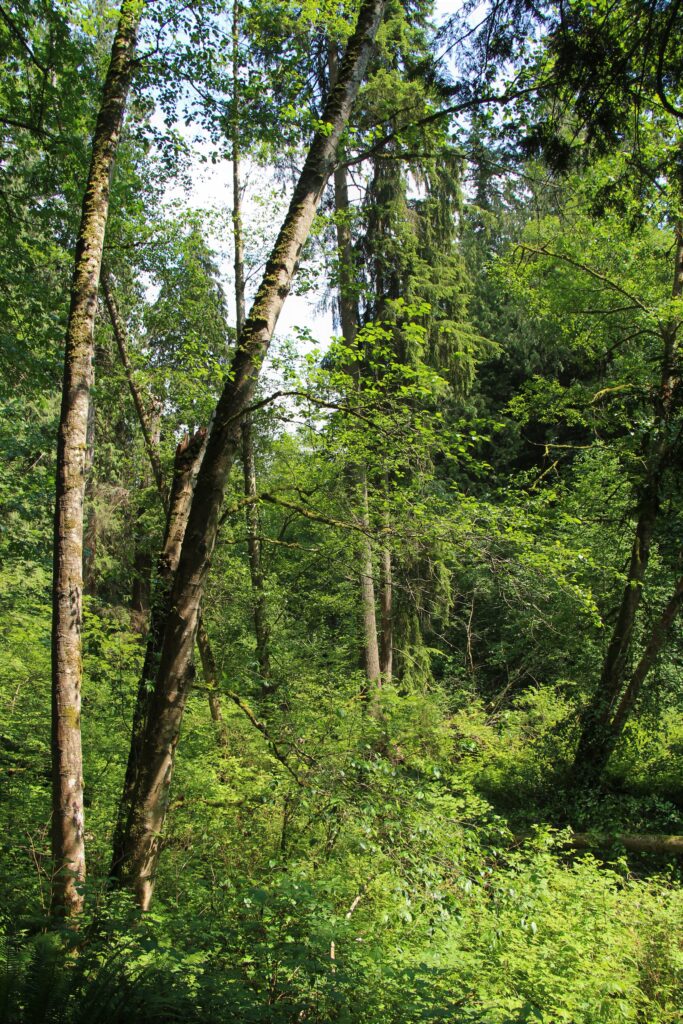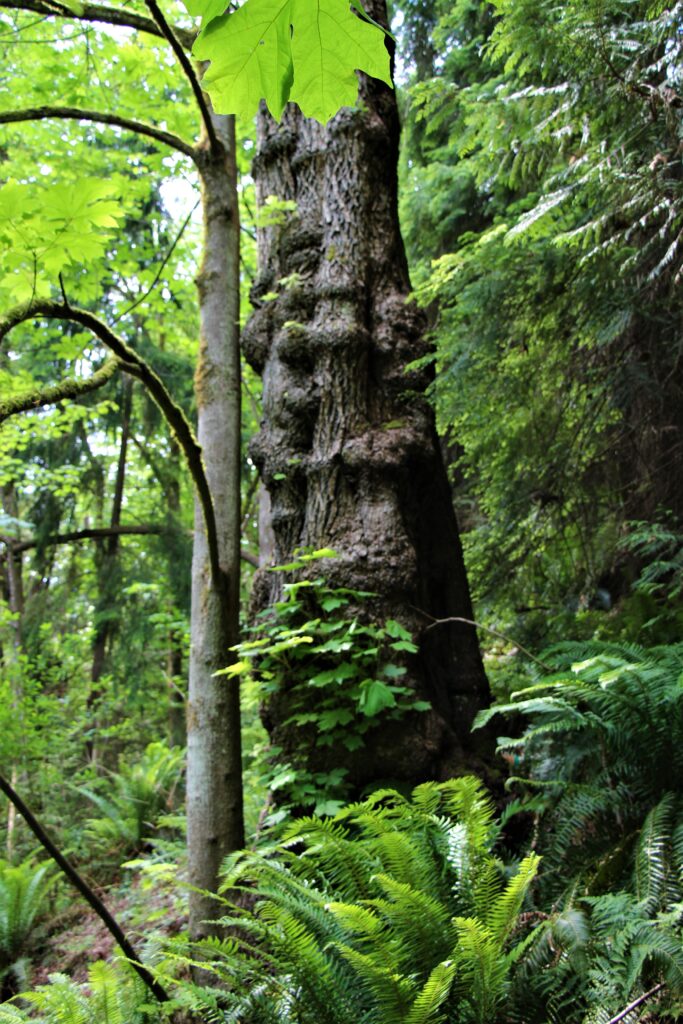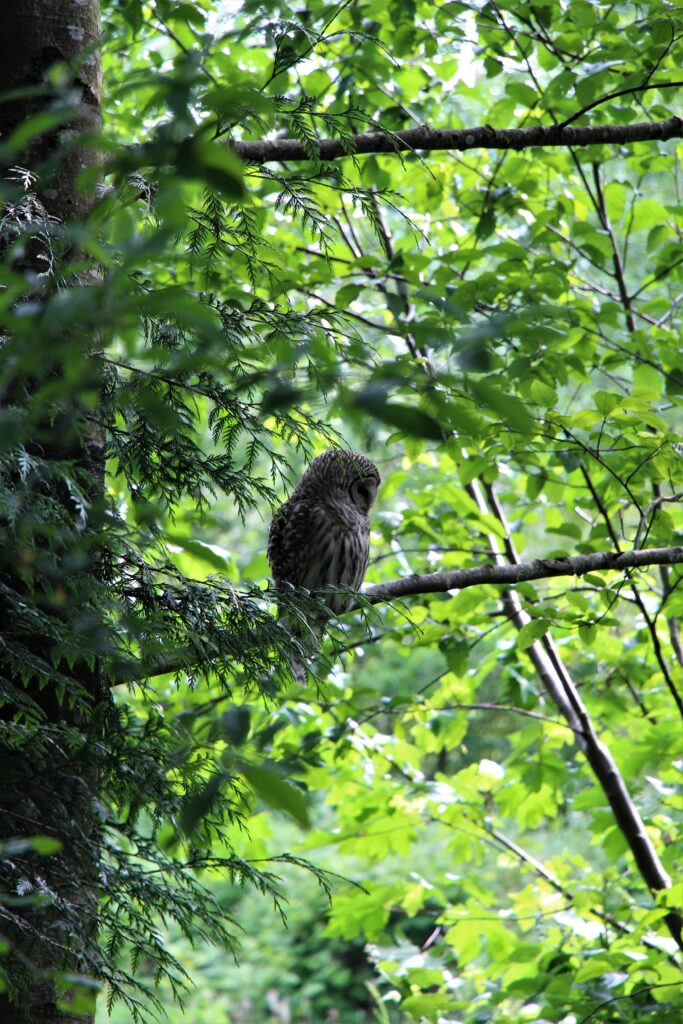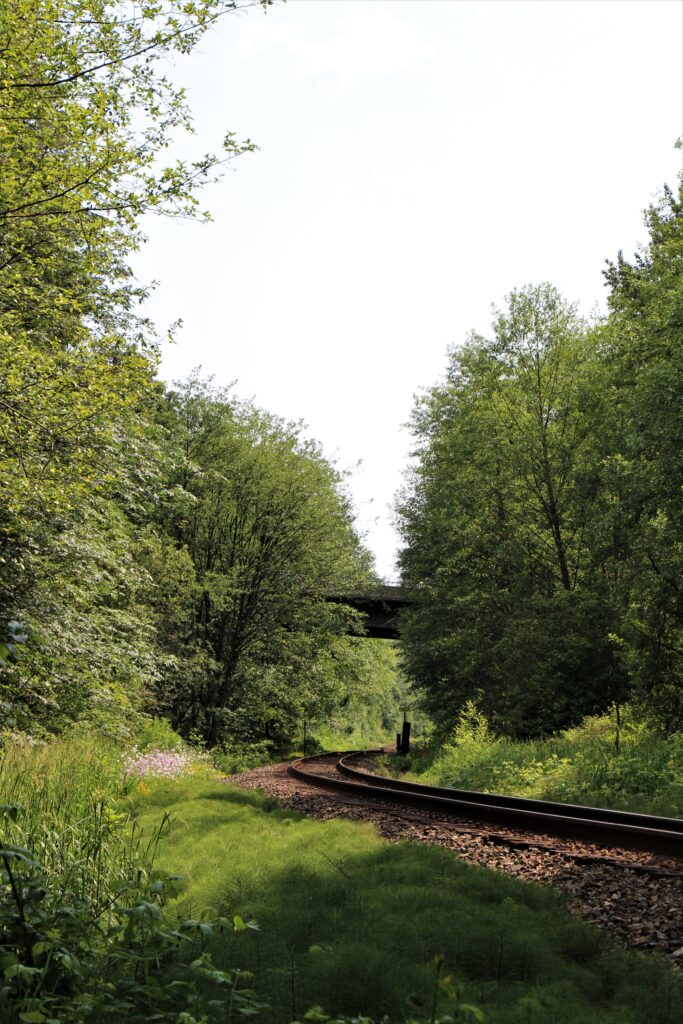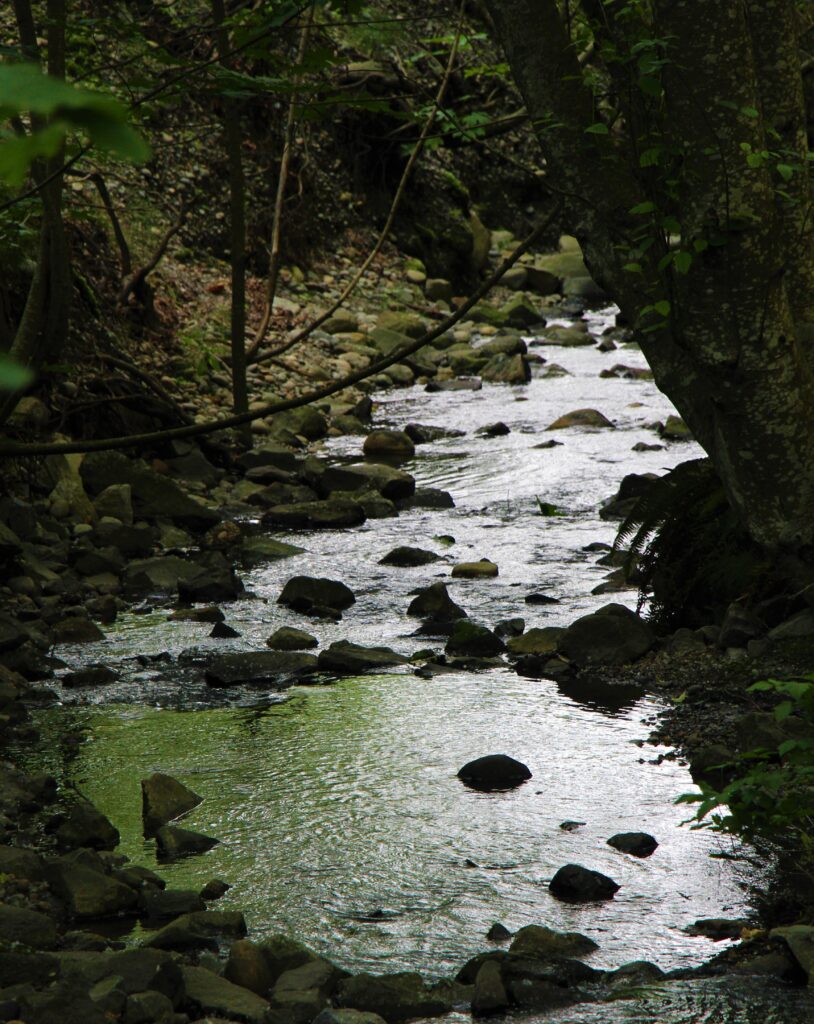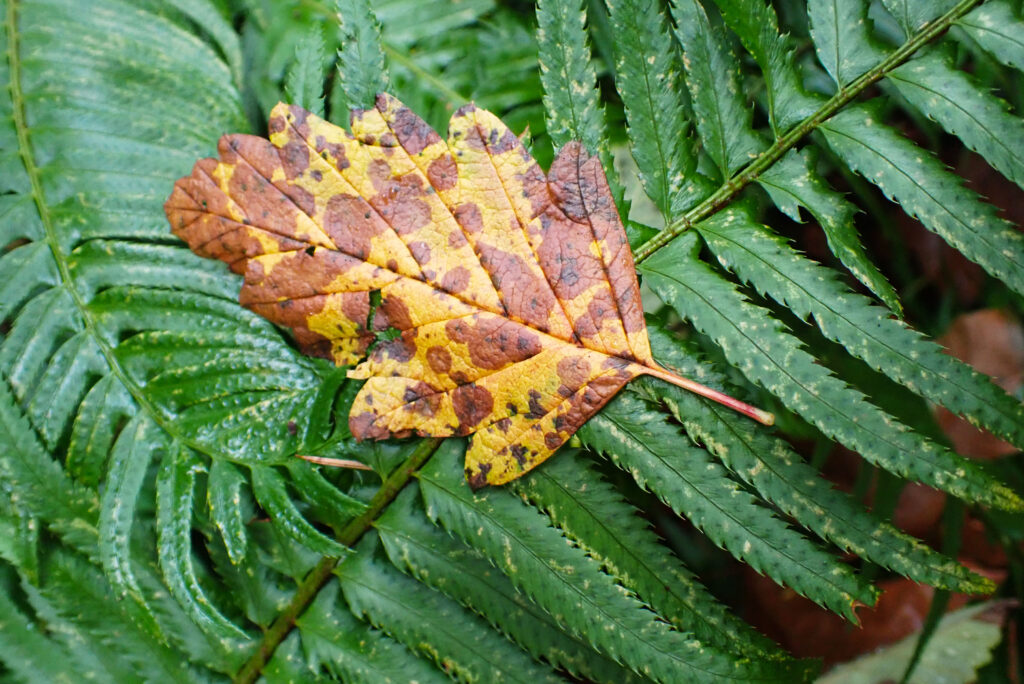
Indigenous teaching and learning are often rooted in the land: sharing stories of place, learning lessons from the forest and river, and respectful outdoor experiences. In reviewing the First Peoples Principles of Learning, it is clear that Indigenous ways of learning embrace sound pedagogical practices. Being experiential and holistic, embedded in story, supporting land and community, exploring one’s identity, and considering the consequences of one’s actions all help cultivate whole-person pedagogy and foster critical thinking and responsible ways of being in the world. KPU Wild Spaces aims to integrate these practices into our events, meetings, and decision-making.
As Leanne Betasamosake Simpson says in her book As We Have Always Done, “If you want to learn about something, you need to take your body onto the land and do it.” As much as possible, the work of KPU Wild Spaces occurs on the land: at the local salmon-spawning Cougar Creek, next to the Western red cedars at KPU Surrey, or out at KPU Farm. In addition to promoting intentional outdoor teaching and learning, KPU Wild Spaces also strives to engage in decolonial work. Some ways we do this is by de-centering the human, active listening when on the land, amplifying Indigenous voices, and taking specific actions. Lee Beavington spearheaded the launch of the Decolonizing Educational Practices website.
Action items for KPU Wild Spaces
1. Transformative territorial acknowledgements. Our events begin with meaningful territorial acknowledgements. Len Pierre’s guide serves both as inspiration here, and as a teaching tool for others to acknowledge land beyond a prescribed statement, and speak from the heart. This can include sharing stories of the particular place, personal ancestry, or specific ways to dismantle colonialism and other forms of oppression. As Robin Wall Kimmerer emphasized to in her John Ruskin Lecture, we need to speak to land justice and elevate Indigenous knowledge.
2. Reciprocity. A regular practice for our events is to give back to the land. This may include cleaning up garbage in Cougar Creek, singing a song to honour a location, advocating for trees or green spaces to be kept wild, or promoting story-sharing of these places such as the χʷəχʷéy_̓əm – Digital ‘Oral Stories’ project (more info on this below).
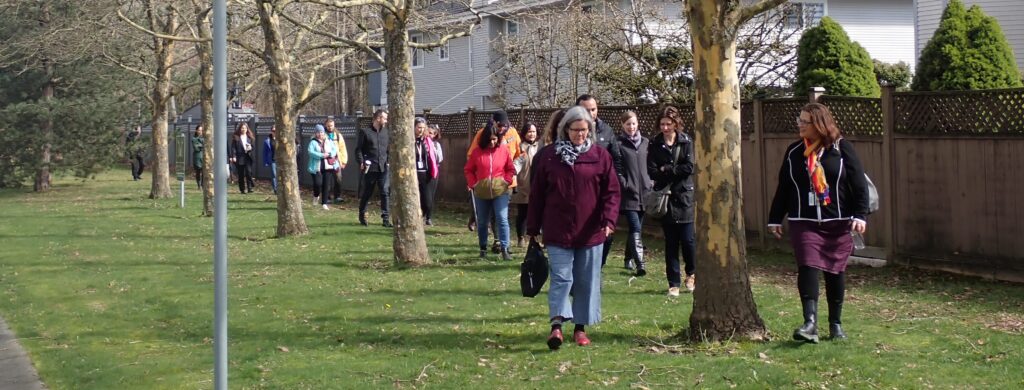
3. Asking powerful questions. Decolonization requires unearthing and dismantling entrenched Western ways of thinking that aim to dominate, tame, and extract from the natural world. By asking powerful questions, we can start to unravel the assumptions of an industrial-exploitative model and move toward an ecocentric paradigm. Some of the questions (or quotes) we have discussed during our events include:
- How can we avoid repeating settler-colonial narratives?
- “Meaning, then, is derived not through content or data or even theory in a Western context, which by nature is decontextualized knowledge, but through a compassionate web of interdependent relationships that are different and valuable because they are different.” ~Leanne Betasamosake Simpson
- “How can we (re)learn to listen to and be taught by the land, in the context of ongoing efforts to objectify, to commodify, to silence, or to speak for the land?” (and even this, Ahenakew says, does not do justice to the ways in which the land teaches through being) ~Cash Richard Ahenakew
- “What might I do that would bring the natural world more explicitly into community decision-making?” ~Wild Pedagogies
- “What happened here? What is happening here now? What should happen here? How to be here?” ~David Greenwood
- “What else can you offer the earth, which has everything? What else can you give but something of yourself? A homemade ceremony, a ceremony that makes a home.” ~Robin Wall Kimmerer
4. Storytelling. The stories we tell about ourselves and places can have a profound impact on our beliefs and ways of being. Stories that give agency to the land, and honour our ancestors and the more-than-human world, can inspire being in right relationship with nature via reverence, relationality, and a strong sense of responsibility or stewardship.
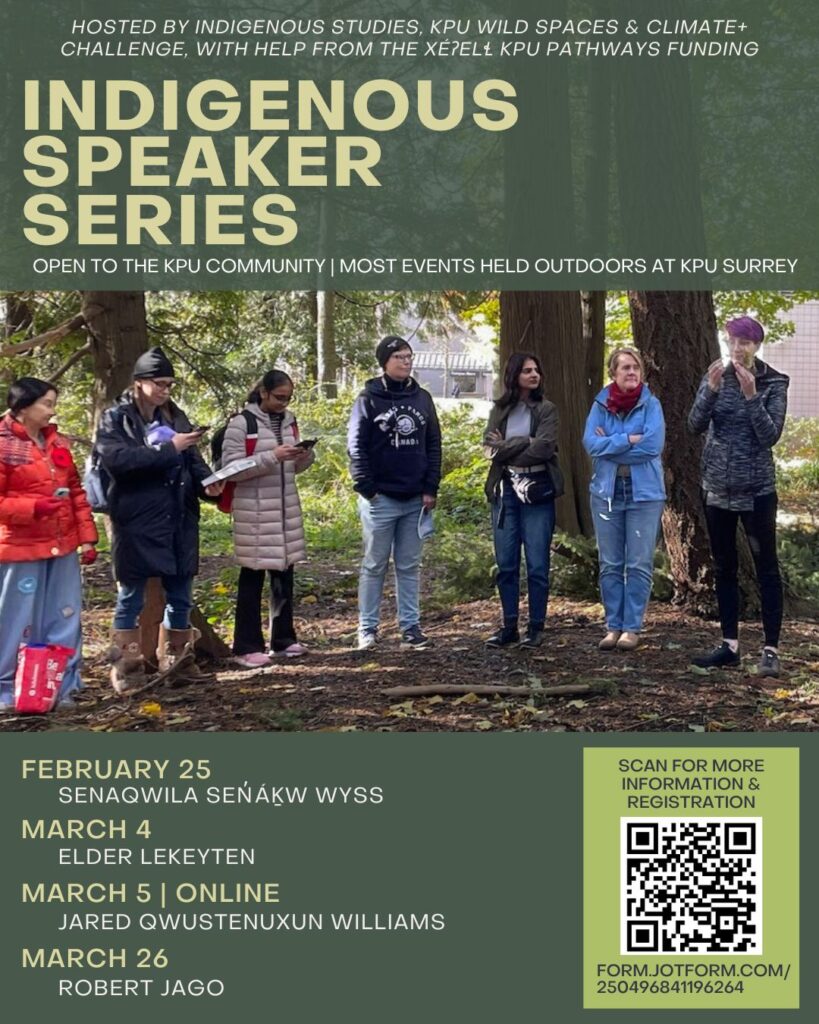
5. Personal growth. Central to the work of decolonization is an inner journey of recognizing biases, getting clear on our positionality and privileges, and understanding the (sometimes unconscious) roles we play in ongoing colonization. This can then lead to questioning and unraveling dominant systems and paradigms. Wild Spaces encourages this process during our events and Community of Practice. We follow Shawn Wilson’s wisdom from his book Research is Ceremony: “If research doesn’t change you as a person, then you aren’t doing it right.”
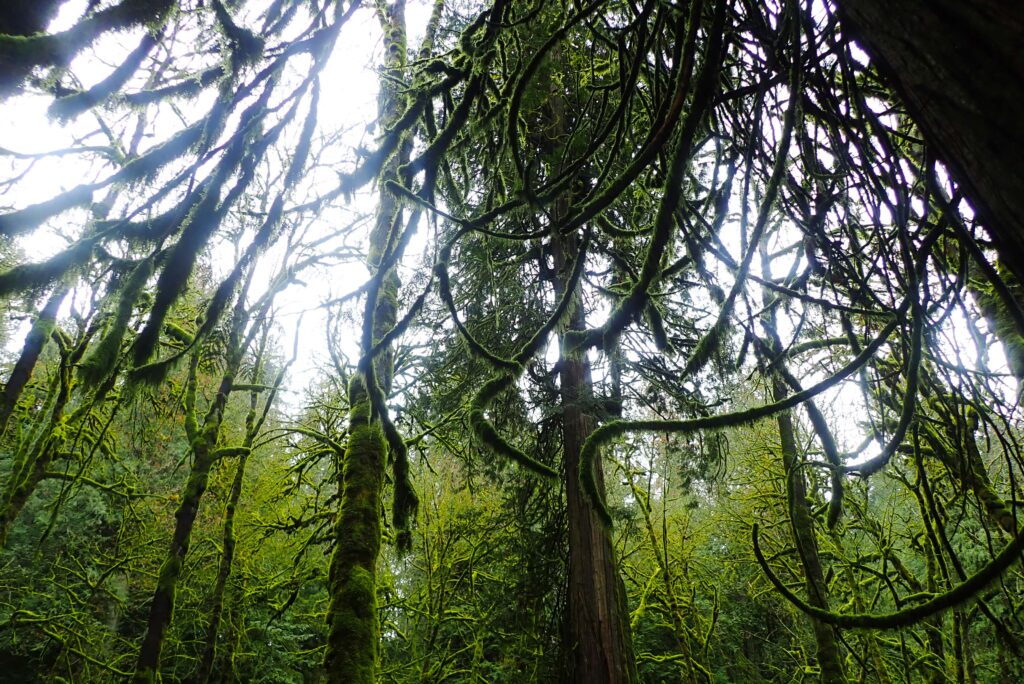
Examples of KPU Wild Spaces initiatives connected to Indigenization
Hosting Events with Indigenous Artist/Writer/Knowledge Keepers
Wild Spaces hosts events with KPU Indigenous artist/writer/knowledge keepers in residence. This includes Elder Lekeyten, Robert Jago (Indigenous Journalist in Residence), Sonya Ballantyne (Indigenous Filmmaker/Writer in Residence), and Senaqwila sen̓áḵw Wyss (Indigenous Entrepreneur in Residence). We also hosted a Decolonization, Storytelling, and Nature Connection event with Elder Richard Pierre (Indigenous Knowledge Keeper in Residence), Selina Boan (Indigenous Writer in Residence), and Napatsi Folger (Indigenous Writer/Artist in Residence).
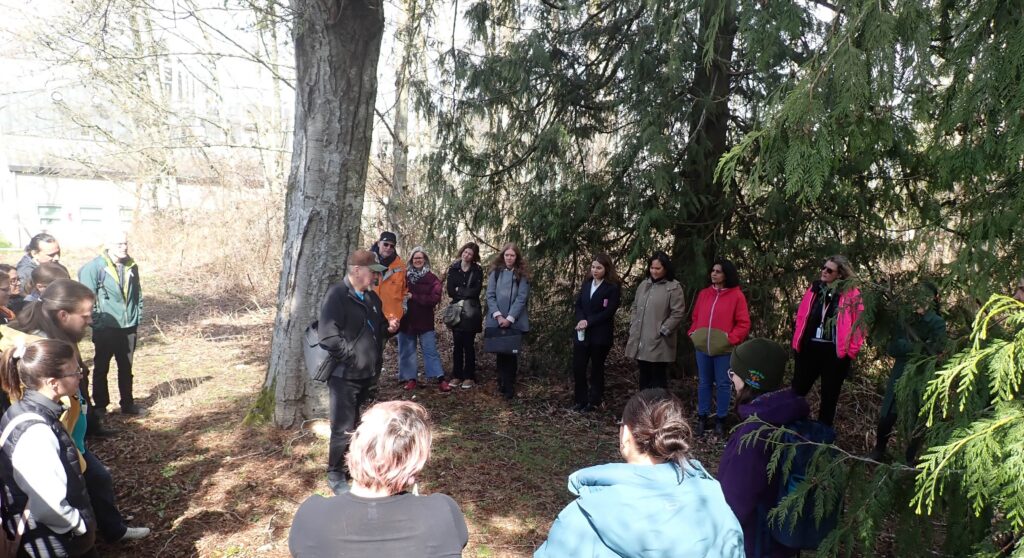
Lekeyten Elder-in-residence Storytelling Project
χʷəχʷéy_̓əm – Digital ‘Oral Stories’
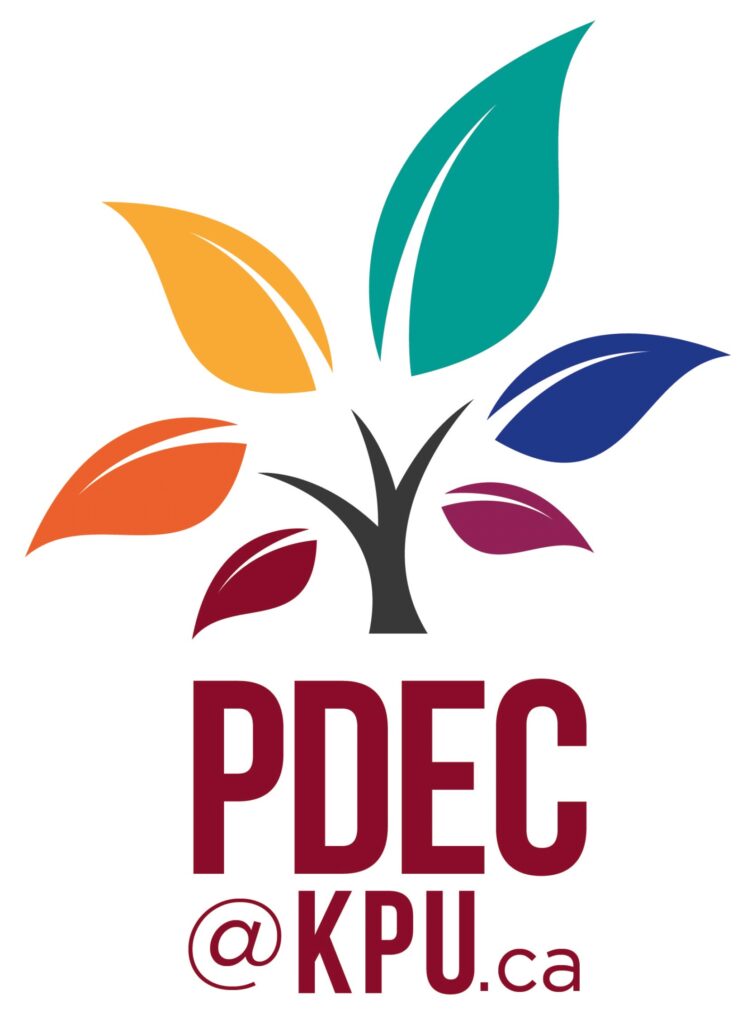
Lee Beavington is part of a team (led by Rachel Chong and Gordon Cobb) for “χʷəχʷéy_̓əm – Digital ‘Oral Stories’ to support land-based learning at KPU. We have recorded Lekeyten, KPU’s Elder-in-Residence, telling site-specific stories so his knowledge can be respectfully shared. This resource will be made available for all KPU learners. One of the recording locations was inspired by a Wild Spaces event at KPU Langley, and Lekeyten was recorded there next to the transformer stone. Funding provided by the President’s Diversity and Equity Committee Fund.
Joseph Dandurand (visit the photo gallery from this event)
Storyteller and poet Joseph Dandurand led an Indigenous writing/storytelling workshop for students, staff and faculty. A flock of crows gathered to participate from the trees above.
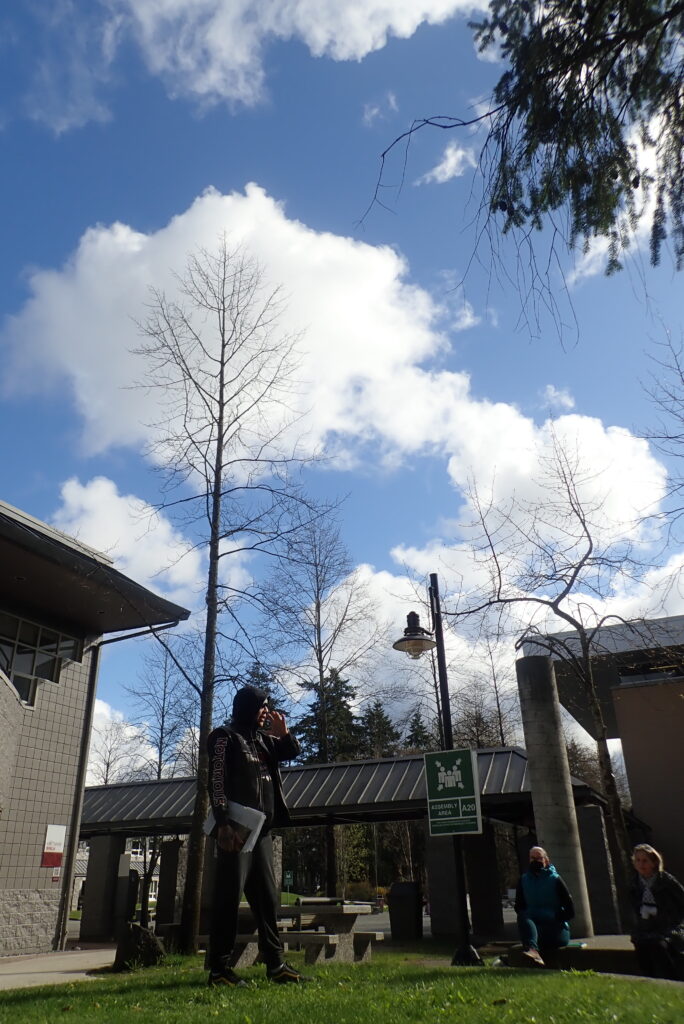
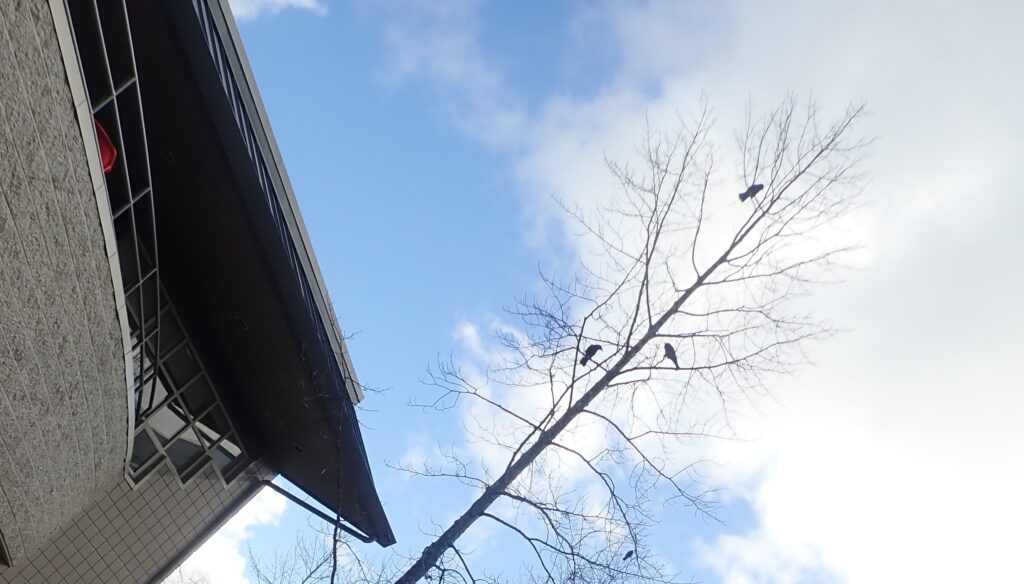
Resources
Below you will find various resources connected to Indigenous ways of knowing and land-based education.
xéʔelɬ KPU Pathway to Systemic Transformation – framework that outlines six pathways for Indigenization and transforming KPU (download PDF)
Decolonizing Educational Practices website
Transformative Territory Acknowledgement Guide by Len Pierre Consulting
Decolonizing Your Syllabus? You Might Have Missed Some Steps – blog post by Dr. Max Liboiron
Indigenization Guides – Six OER guides created by BCcampus and the Ministry of Post-Secondary Education and Future Skills
Knowing Home: Braiding Indigenous Science with Western Science – OER guide by Gloria Snively and Wanosts’a7 Lorna Williams
Land Education: Rethinking Pedagogies of Place from Indigenous, Postcolonial, and Decolonizing Perspectives edited by Kate McCoy, Eve Tuck and Marcia McKenzie
As We Have Always Done: Indigenous Freedom through Radical Resistance by Leanne Betasamosake Simpson
Research is Ceremony: Indigenous Research Methods by Shawn Wilson
For settler-teachers/scholars, the following may prove helpful in showing the ways settlers can contribute to decolonial work.
Walking Forward: Learning From Place – collaborative resource by Dr. Gillian Judson, Heidi Wood, Dr. Judy Halbert and Dr. Linda Kaser
“Land, Language and Listening: The Transformations That Can Flow from Acknowledging Indigenous Land” by Sean Blenkinsop and Mark Fettes. https://doi.org/10.1111/1467-9752.12470 (please email Lee for access)
Decolonization – First Steps in a Learning Journey blog post by Christina Page

As Leanne Betasamosake Simpson says:
“get out, get involved, and get invested.”
